UK and Argentina agree to identify Falklands war dead
Two countries will work together to name more than 100 Argentinians killed in 1982 conflict
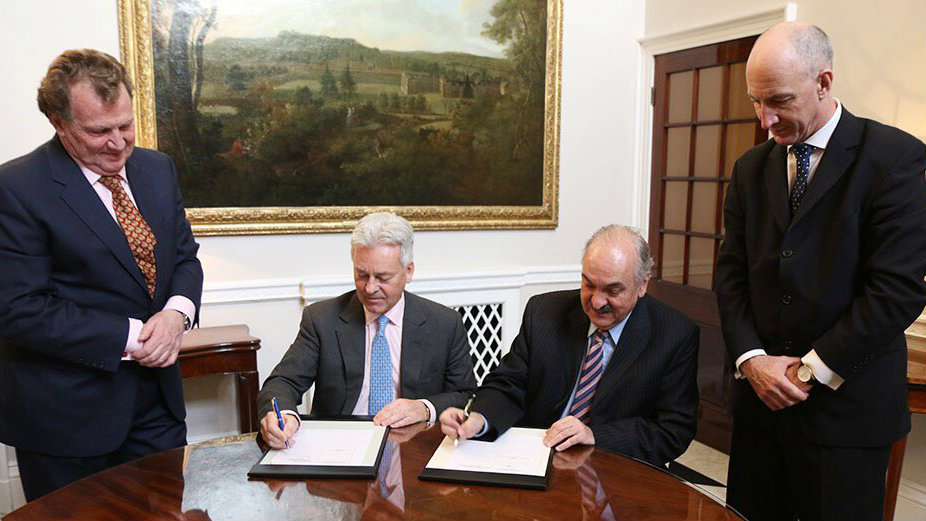
A free daily email with the biggest news stories of the day – and the best features from TheWeek.com
You are now subscribed
Your newsletter sign-up was successful
Mauricio Macri wins Argentina presidency: what next for the Falklands?
23 November 2015
Conservative Mauricio Macri has won Argentina's presidential elections, fuelling hope for better relations with Britain over the disputed Falkland Islands.
President Cristina Fernandez de Kirchner, who is constitutionally barred from seeking a third term, has baited the UK over the status of the islands during her eight years in office.
The Week
Escape your echo chamber. Get the facts behind the news, plus analysis from multiple perspectives.

Sign up for The Week's Free Newsletters
From our morning news briefing to a weekly Good News Newsletter, get the best of The Week delivered directly to your inbox.
From our morning news briefing to a weekly Good News Newsletter, get the best of The Week delivered directly to your inbox.
The first round of Argentina's presidential election was held last month, but there was no outright winner. In the second-round run-off this weekend, Macri won 51.5 per cent of the votes, beating his centre-left rival Daniel Scioli, who won 48.5 per cent.
Macri, the mayor of the City of Buenos Aires and former president of Argentina's football club Boca Juniors, danced on stage at a victory rally and thanked his staff for their hard work, reports the BBC.
While political commentators say Macri is unlikely to question Argentina's claim to the Falklands, residents on the isles are hoping for a new neighbouring president who will be less intent on pushing the issue than Kirchner.
Macri's foreign policy chief, Fulvio Pompeo, told the Daily Telegraph last month that he would take a less aggressive stance over the Falklands should he win in the election.
A free daily email with the biggest news stories of the day – and the best features from TheWeek.com
"We have to restore this relationship that has been frozen in recent years, as a result of this conflict," said Pompeo. "We will maintain forever our claim to the Falklands. But our relations with Britain should be broadened."
Macri also signalled that he would abolish the government role of Falklands secretary, or Malvinas secretary, created by Kirchner in 2013.
[[{"type":"media","view_mode":"content_original","fid":"87217","attributes":{"class":"media-image"}}]]
His victory ends the 12-year rule of the Peronist Party, led first by Nestor Kirchner in 2003, followed by his wife Cristina in 2007. Addressing thousands of cheering supporters, Macri said: "Today is a historic day. It's the changing of an era."
Writing for The Conversation, Alasdair Pinkerton, senior lecturer in human geography at Royal Holloway, says: "For Falkland Islanders, the political passing of the Kirchners might seem justifiable cause for raucous celebrations in the pubs and government offices of Stanley. After all, their lives and livelihoods have been hit hard by aggressive Argentine policies during the Kirchner years."
However, he notes that far from squeezing the economic life out of the islands the Kirchner years have turned them into a media-savvy and politically active community.
"With their vote-chasing grandstanding, the Kirchners have turned one and perhaps two generations of Falkland Islanders firmly against any kind of co-operation with Argentina," says Pinkerton.
"Herein lies the lesson for the Kirchners' successor. Until Argentina once again treats the Falklands-Malvinas issue as both a diplomatic and fundamentally human problem and not an object of domestic political opportunism, the islanders will continue to turn away from their nearest neighbour and forge their own future."
Falklands: will new Argentinian president be less combative?
28 October
Argentina will vote for a new president next month, fuelling hope for better relations with Britain over the disputed Falkland Islands.
President Cristina Fernandez de Kirchner, who is constitutionally barred from seeking a third term, has baited the UK over the status of the islands during her eight years in office.
The first round of Argentina's presidential election was held over the weekend, but there was no outright winner. Centre-left candidate Daniel Scioli won 36.9 per cent of the vote, but to obtain a first-round victory he had to win more than 45 per cent, or 40 per cent with a 10 per cent lead on the first runner-up.
He therefore faces a run-off election on 22 November against centre-right candidate Mauricio Macri, who won 34.3 per cent of the vote.
Neither is likely to question Argentina's claim to the Falklands, but residents on the isles are hoping for a new neighbouring president who will be less intent on pushing the issue then Kirchner.
A win for Mauricio Macri
Former president of Argentina's football club Boca Juniors, Macri is currently mayor of the City of Buenos Aires and running for the PRO party. His foreign policy chief, Fulvio Pompeo, has told the Daily Telegraph he would take a less aggressive stance over the Falklands should he win in the election.
"We have to restore this relationship that has been frozen in recent years, as a result of this conflict," said Pompeo. "We will maintain forever our claim to the Falklands. But our relations with Britain should be broadened." Macri has also signalled that he would abolish the government role of Falklands Secretary, or Malvinas Secretary, created by Kirchner in 2013.
A win for Daniel Scioli
Scioli, who has been leading the polls, is the candidate of the ruling Peronist coalition and has the backing of Kirchner. The millionaire businessman has been governor of Buenos Aires province, a hugely influential post, since 2007. While Macri has pledged to "turn down the rhetoric" on the Falklands, there is widespread expectation that Scioli would also "seek to adopt a fresh and less belligerent tone in the hope of bringing Britain to the table", says The Independent.
Should he win, Scioli has suggested that Mario Blejer, a renowned economist and advisor to the Bank of England, could be named Argentina's ambassador to Britain. Described by the Daily Express as an "anglophile", Blejer would replace Alicia Castro, who has vocally campaigned for the Falklands to accept rule by Buenos Aires. Nevertheless, Scioli has said Blejer would be expected to "advance the Malvinas Islands question" as part of his responsibilities.
Falklands War: Argentine troops 'tortured by their officers'
15 September
Argentine soldiers were tortured and abused by their own commanding officers during the Falklands War, newly-released documents have revealed.
The official documents are the first of their kind to be declassified by the Argentinean government and detail the brutal treatment of soldiers during the conflict.
One lieutenant described how his arms and legs were bound and he was left face down on a beach for hours, while one sergeant detailed how he underwent surgery after being kicked in the testicles.
The files also include accounts of soldiers who experienced mock executions and were tied up inside empty graves. The troops claim they were poorly equipped throughout the war and were beaten if they left the trenches in search of food.
Argentine soldiers have long made claims of mistreatment, but this is the first time their accusations have been corroborated by official documents.
"These documents lift the veil on facts that were hidden for so many years by the armed forces," Ernesto Alonso, from a veterans group in La Plata, told the BBC.
The islands, known regionally as Las Malvinas, were invaded by Argentina in 1982 – a war that lasted ten weeks and cost the lives of 655 Argentine troops, 255 British servicemen and three Falkland Islanders.
President Cristina Fernandez de Kirchner has described Britain's presence as a "blatant exercise of colonialism," but the UK government has refused to negotiate giving up control of the islands.
Tensions resurfaced three years ago when Prince William was deployed to the islands and the UK sent a new warship, HMS Dauntless, provoking anger in Argentina. In 2013, Falkland Island residents voted to remain part of Britain in a referendum.
Falkland Islands: Pope pictured with sign calling for 'dialogue'
21 August
Pope Francis has been pictured holding up a sign calling for dialogue over the sovereignty of the Falkland Islands – but the Vatican has said he did not intend to take a stand on the issue.
Meeting the crowd at a general audience earlier this week, the Pope was handed a sign by a member of the public. It read, in Spanish: "It's time for dialogue between Argentina and the United Kingdom over the Falkland Islands."
Francis held the sign for a while, and photographs of him with it have been reproduced around the world – particularly in his homeland, Argentina, where the populist government has urged Britain to give up the islands.
It is not at all clear from the pictures that Francis knew what was written on the sign as he held it – and the Vatican has insisted he did not. Even the Argentinian foreign ministry said only that Francis had "received" a pro-dialogue message.
A Vatican spokesman told the Daily Telegraph: "There has been no change of position on this issue. The Pope does not want to enter into this debate.
"The Pope is presented with many things during his general audiences. He receives a long queue of people. Holding something does not mean that he is taking a position either way."
When Francis was known as Rev Jorge Bergoglio he spoke in "nationalistic" terms about the islands, which are known in his homeland as Las Malvinas, says The Guardian. Since becoming Pope, he has not mentioned the dispute.
Francis has maintained this silence despite a formal request from Argentina's president Cristina Fernandez de Kirchner that he intervene. Kirchner yesterday tweeted pictures of the Pope with the sign, and without repeating the Vatican denial.
The islanders voted overwhelmingly to remain British in a March 2013 referendum.
Falklands war: Thatcher papers reveal clash over military strategy
19 June
At the height of the Falklands War, Margaret Thatcher suspected that her foreign secretary, Francis Pym, was attempting to combine with the Americans to outmanoeuvre her, according to revelations contained in newly released memoirs.
The documents reveal that Thatcher clashed with Pym in two cabinet meetings, as the Foreign Secretary attempted to work alongside the US to resolve the conflict diplomatically rather than resorting to war.
The revelations were uncovered in previously unreleased memoirs written a year after the 1982 conflict. The papers have been "gifted to the nation" by Thatcher's estate in lieu of £1m of inheritance tax under an Arts Council England scheme, The Guardian reports.
The Arts Council England says the Falklands memoir is "probably the single most significant historical document Margaret Thatcher ever wrote".
The memoirs detail two separate clashes between Thatcher and Pym. The first was on 24 April, when Pym returned from a visit to Washington with a peace proposal he urged cabinet ministers to support. Thatcher wrote: "This was to be one of the most crucial days in the Falklands story and a critical one for me personally. Early on Saturday morning Francis came to my study in No 10 to tell me the results of his efforts. The document he brought back was a complete sellout."
Thatcher was unwilling to put the proposal to Cabinet, but Pym insisted. The plan was in any case rejected by Argentina.
The second dispute came ten days later, after the sinking of the General Belgrano and Argentina's attack on the HMS Sheffield. Pym tabled another peace proposal before the UK cabinet. The plan was received favourably, but the terms were again rejected by the Argentinians, "making Pym's 'victory' academic", the Guardian says.
Thatcher donated most of her papers before her death in 2013. The majority are held by the Margaret Thatcher Foundation, which is based in Churchill College.
-
 The 8 best TV shows of the 1960s
The 8 best TV shows of the 1960sThe standout shows of this decade take viewers from outer space to the Wild West
-
 Microdramas are booming
Microdramas are boomingUnder the radar Scroll to watch a whole movie
-
 The Olympic timekeepers keeping the Games on track
The Olympic timekeepers keeping the Games on trackUnder the Radar Swiss watchmaking giant Omega has been at the finish line of every Olympic Games for nearly 100 years
-
 How corrupt is the UK?
How corrupt is the UK?The Explainer Decline in standards ‘risks becoming a defining feature of our political culture’ as Britain falls to lowest ever score on global index
-
 The high street: Britain’s next political battleground?
The high street: Britain’s next political battleground?In the Spotlight Mass closure of shops and influx of organised crime are fuelling voter anger, and offer an opening for Reform UK
-
 Is a Reform-Tory pact becoming more likely?
Is a Reform-Tory pact becoming more likely?Today’s Big Question Nigel Farage’s party is ahead in the polls but still falls well short of a Commons majority, while Conservatives are still losing MPs to Reform
-
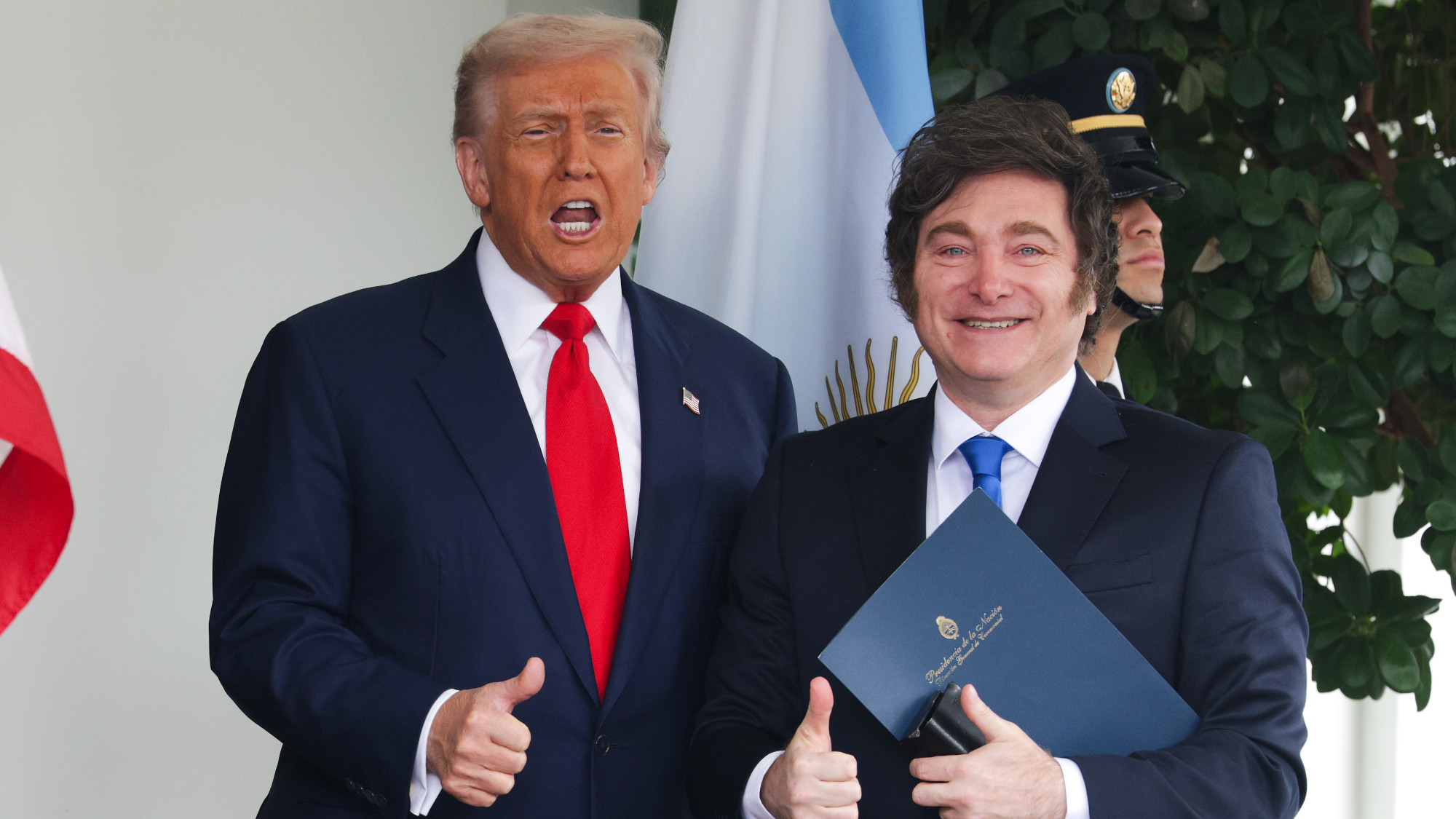 Bailouts: Why Trump is rescuing Argentina
Bailouts: Why Trump is rescuing ArgentinaFeature The White House approved a $20 billion currency swap with Argentina
-
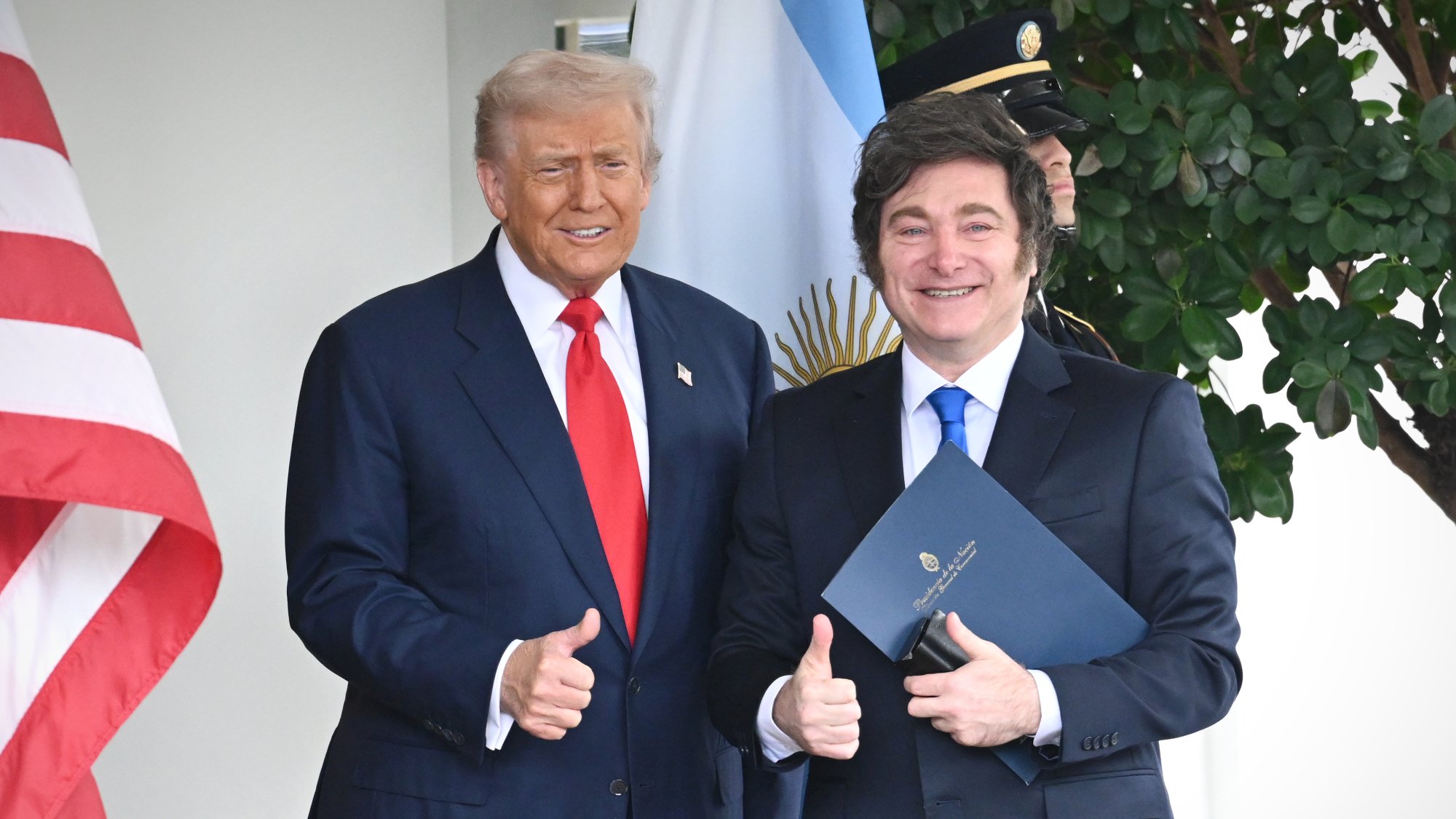 Trump ties $20B Argentina bailout to Milei votes
Trump ties $20B Argentina bailout to Milei votesspeed read Trump will boost Argentina’s economy — if the country’s right-wing president wins upcoming elections
-
 Taking the low road: why the SNP is still standing strong
Taking the low road: why the SNP is still standing strongTalking Point Party is on track for a fifth consecutive victory in May’s Holyrood election, despite controversies and plummeting support
-
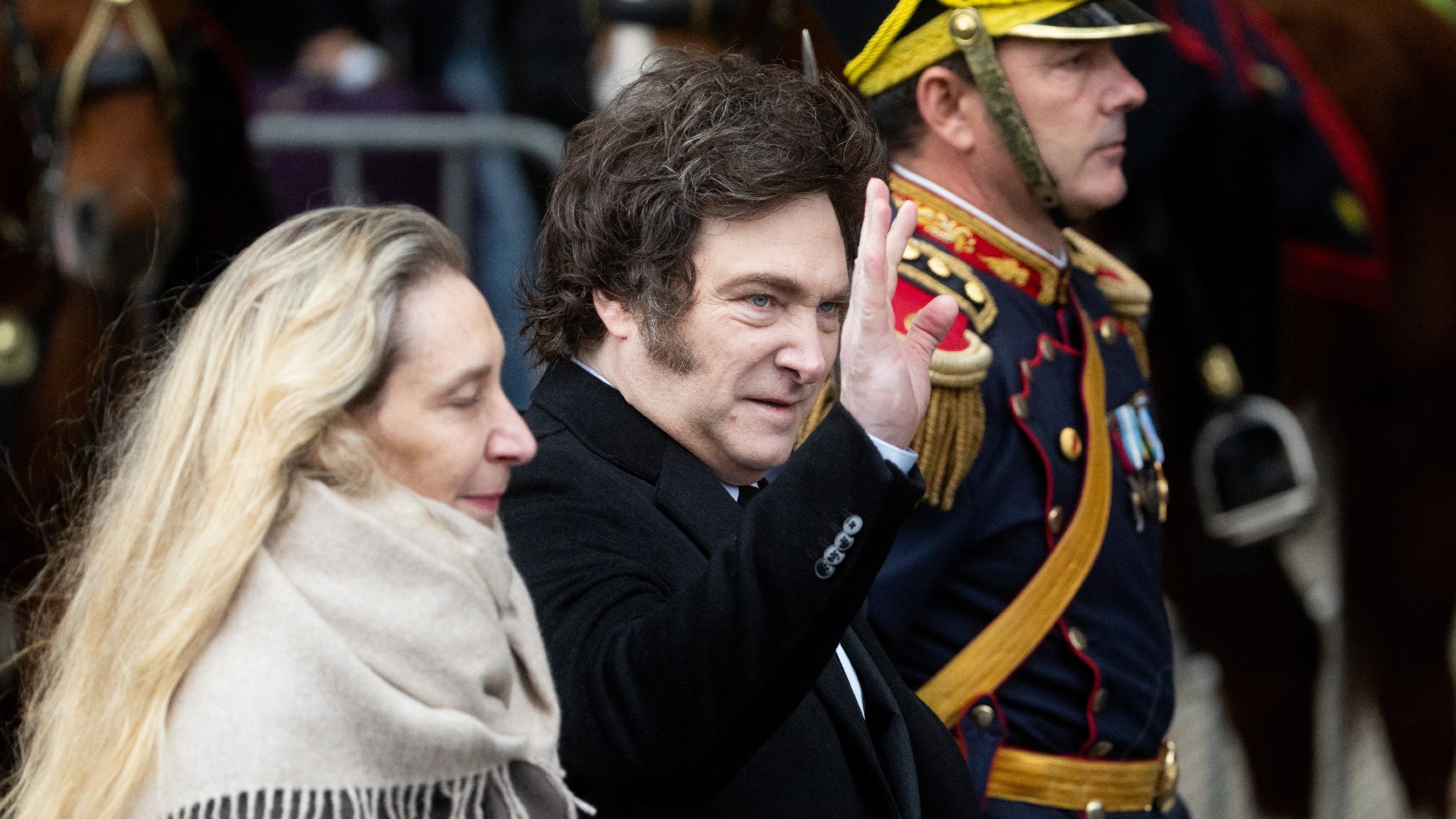 Under siege: Argentina’s president drops his chainsaw
Under siege: Argentina’s president drops his chainsawTalking Point The self-proclaimed ‘first anarcho-capitalist president in world history’ faces mounting troubles
-
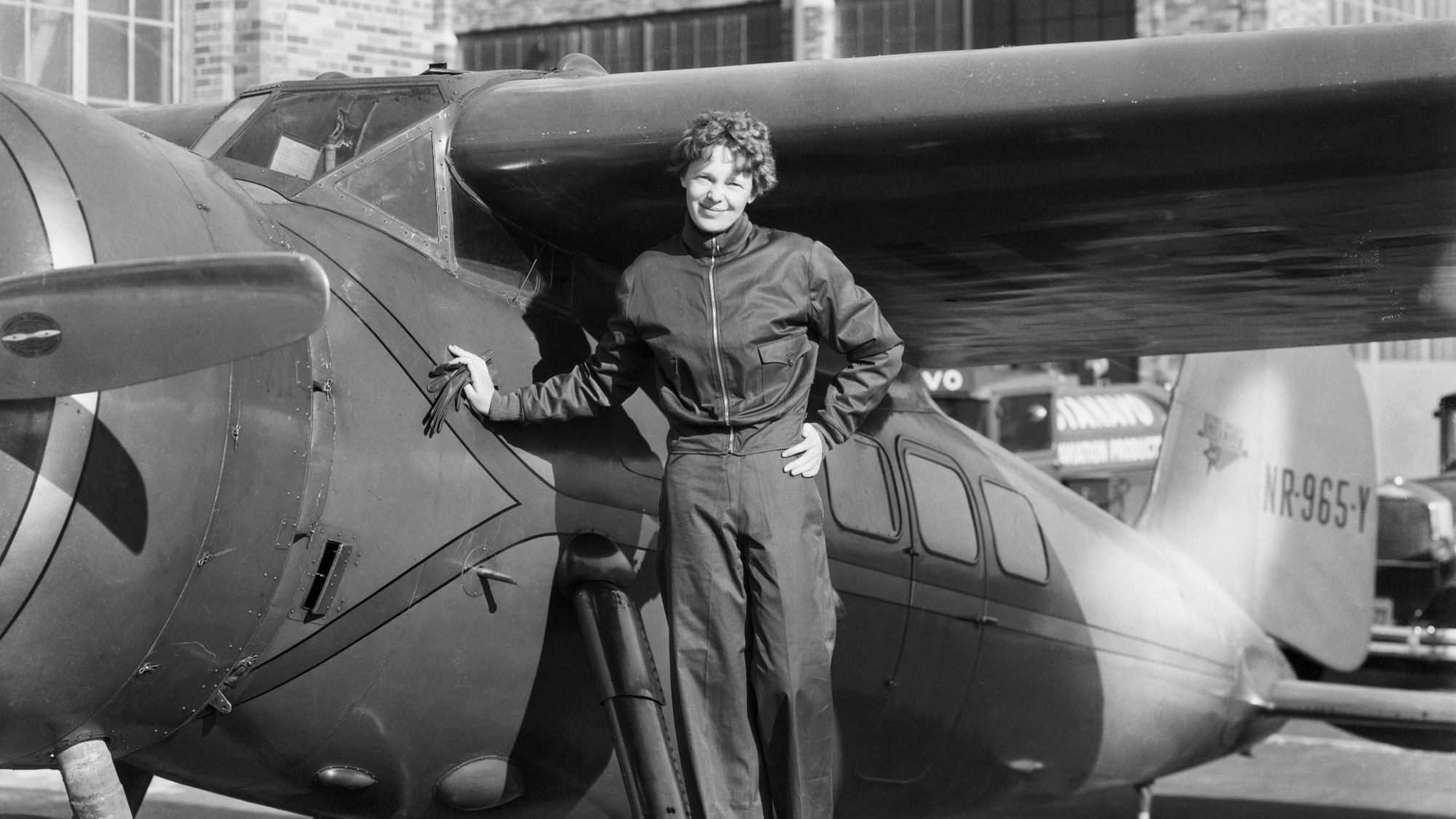 ‘Conspiracy theories about her disappearance do a disservice’
‘Conspiracy theories about her disappearance do a disservice’Instant Opinion Opinion, comment and editorials of the day